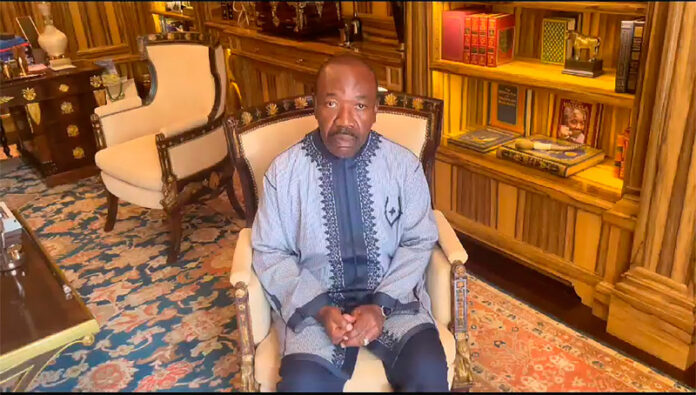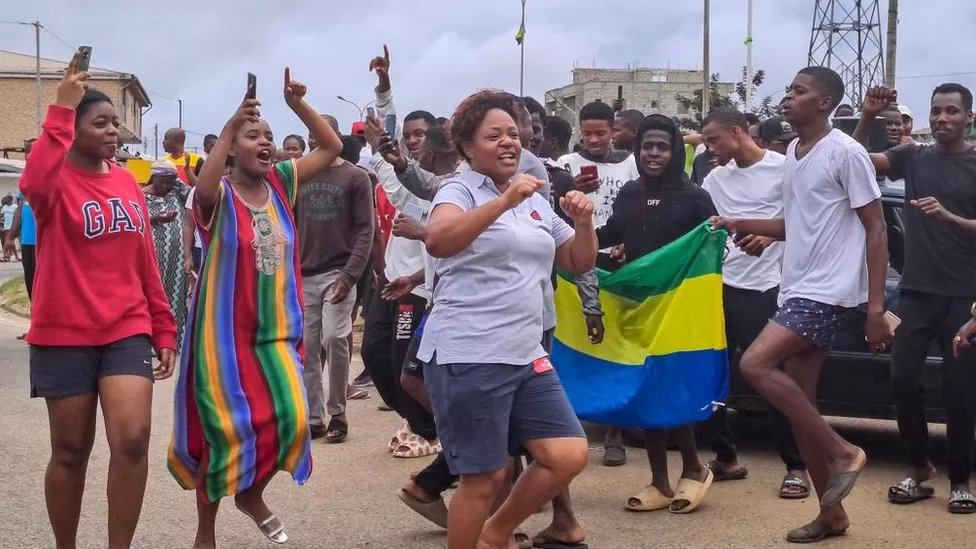
Gabon’s President Ali Bongo has appealed for help after the army deposed him in a coup and put him under house arrest.
Speaking on Wednesday from what he said was his residence, he urged supporters to “raise your voice”.
Earlier, army officers appeared on TV to say they had taken power.
They said they had annulled the results of Saturday’s election in which Mr Bongo was declared the winner, but the opposition claimed it was fraudulent.
The officers also said they had arrested one of Mr Bongo’s sons for treason.
Later, they announced that Mr Bongo would be replaced by the head of the presidential guard, Gen Brice Oligui Nguema, who was earlier carried triumphantly through the streets of the capital Libreville.
They said that from Thursday, “the people of Gabon will once again be free to go about their business between 6am and 6pm” – but traffic restrictions would remain in place for now.
Mr Bongo’s overthrow would end his family’s 55-year hold on power in Gabon.
The country is one of Africa’s major oil producers, while nearly 90% of it is covered by forests. It joined the Commonwealth in June 2022, becoming one of the group’s few members not to have been a British colony.
Where is Gabon? It’s an oil-rich country on the west coast of Central Africa, with a small population of just 2.4 million.
Who is Ali Bongo? He was declared the winner of Saturday’s disputed elections and has been president since 2009. Before that, his father was in power for 41 years.
Why was there a coup? The army don’t accept the election results and say they took power to keep the peace.
In his video message, Mr Bongo confirmed he was under house arrest.
“My son is somewhere, my wife is in another place… Nothing is happening. I don’t know what is going on,” he said in English, before again asking for help.
A communications company that was working for the presidency during the election has been in contact with the BBC to confirm the authenticity of the footage. It said it had been asked by Mr Bongo’s office to circulate the video.
In their TV statement the coup leaders said they were cancelling the results of the election and dissolving “all the institutions of the republic”.
The country’s borders had been closed “until further notice”, they added.
It came after Gabon’s electoral commission said Mr Bongo had won just under two-thirds of the votes in Saturday’s election, which the opposition argued was fraudulent.
One of the soldiers said they had “put an end to the current regime” because of “irresponsible, unpredictable governance resulting in a continuing deterioration in social cohesion that risks leading the country into chaos”.
Later on Wednesday, the military officers who seized Mr Bongo said he would be replaced by the head of the presidential guard, Gen Brice Oligui Nguema, who was earlier carried triumphantly through the streets of the capital.

This is the eighth coup in former French colonies in Africa in the past three years.
However, most of the others have been further north, in the Sahel region, where an Islamist insurgency has led to rising complaints that the democratically elected governments were failing to protect the civilian populations.
In Gabon there is no doubt that having been in power since 1967, many have had enough of the Bongo family dynasty.
People were quick to take to the streets, appearing to be genuinely delighted. So far there is little sign of a pushback.
The French government has condemned the takeover, with a spokesman calling for the election results to be respected.
However, French influence in Africa has waned significantly in recent years, and a call for yet more years of Ali Bongo is unlikely to go down well.
By BBC’s Kathryn Armstrong, Will Ross in Nairobi and Gaius Kowene in Dakar





















